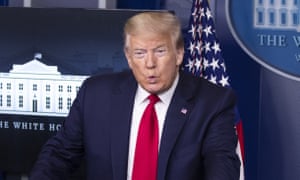President’s planned weakening of social media law may not have effect he thinks it will

Photograph: Alex Brandon/AP
Donald Trump’s apparent plans to punish Twitter for appending a factcheck to his claims that mail-in ballots would be “substantially fraudulent” could reshape the web – but not necessarily in the ways he or his supporters intend.
Trump’s expected avenue of attack focuses on section 230 of the Communications Decency Act. That law underpins much of how the internet is regulated in the United States, by effectively creating the hybrid publisher/platform model that has become the norm for social media companies worldwide.
Before the CDA, passed in 1996, American communications firms had two options under the law: they could either act as “mere conduits”, passing on all content without alteration – akin to a phone service – or they could intervene, moderating their platforms but taking legal liability for anything they let pass.
Section 230 changed that, by creating a legal exception that allows platforms to moderate their sites as they see fit, without taking on the risk of being sued for the content they leave up. It holds that: “No provider or user of an interactive computer service shall be treated as the publisher or speaker of any information provided by another information content provider.” The clause has been described by the lawyer Jeff Kosseff as “The Twenty-Six Words That Created the Internet”.
The law has been widely misunderstood in the years since it passed, noted the neoconservative thinktank AEI, with one “unfortunately persistent misunderstanding” being that it requires platforms to exercise political neutrality. As a result, it has come under increasing attack, particularly from the US right, which believes it is the victim of undue censorship from major web platforms.
According to a draft executive order seen by Reuters, Trump plans to hit back at Twitter by weakening section 230. The order would require the Federal Communications Commission to “clarify” the law in a number of ways, proposing that “editing content” could lead to a platform forfeiting its protections under section 230, as well as looking at whether it uses “deceptive policies” to moderate, or if those policies are “inconsistent with its terms of service”.
If the FCC followed suit and implemented the suggestions into regulation, the primary goal appears to be to force the companies to dial back their actions, for fear of losing the protection. A ban on “editing” content, for instance, would seem to be targeted at warnings like those Twitter appended to Trump’s mail-in ballots tweets, while the ban on “deceptive policies” has been interpreted as an attempt to formally introduce a requirement for political neutrality into the section 230 constraints.
But the regulation could backfire, at least in terms of creating the internet Trump desires. By barring social media companies from using the nuanced forms of moderation they currently employ, the executive order could force them to resort to heavy-handed actions: deleting posts, or blocking users, rather than simply factchecking or reducing the reach of the worst material.
Similarly, removing section 230 protections entirely from a technology firm would be unlikely to force it to act as a politically neutral “mere conduit”, since any moderation at all – even simply deleting the vast quantities of automated spam that hit platforms such as Facebook and Twitter each day – would then open them up to lawsuits about the content they had left up.
As Kosseff said in 2019: “Are they saying you don’t do any moderation at all? A free for all? I seriously would not want to be on the internet at all if that was the case.”
This article contains affiliate links, which means we may earn a small commission if a reader clicks through and makes a purchase. All our journalism is independent and is in no way influenced by any advertiser or commercial initiative. By clicking on an affiliate link, you accept that third-party cookies will be set. More information.



